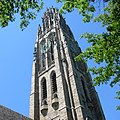| Discipline | Literary magazine |
|---|---|
| Language | English |
| Edited by | Meghan O'Rourke |
| Publication details | |
Former names | The Christian Spectator, The New Englander |
| History | 1819–1989, 1991–present |
| Publisher | |
| Frequency | Quarterly |
| Standard abbreviations | |
| ISO 4 | Yale Rev. |
| Indexing | |
| ISSN | 0044-0124 (print) 1467-9736 (web) |
| Links | |
The Yale Review is the oldest literary journal in the United States. It is published by Johns Hopkins University Press. [1]
Contents
It was founded in 1819 as The Christian Spectator to support Evangelicalism. Over time it began to publish more on history and economics and was renamed The New Englander in 1843. In 1885 it was renamed The New Englander and Yale Review until 1892, when it took its current name The Yale Review. At the same time, editor Henry Wolcott Farnam gave the periodical a focus on American and international politics, economics, and history.
The modern history of the journal starts in 1911 under the editorship of Wilbur Cross. Cross remained the editor for thirty years, throughout the magazine's heyday. Contributors during this period, according to the Review's website, included Thomas Mann, Henry Adams, Virginia Woolf, George Santayana, Robert Frost, José Ortega y Gasset, Eugene O'Neill, Leon Trotsky, H. G. Wells, Thomas Wolfe, John Maynard Keynes, H. L. Mencken, A. E. Housman, Ford Madox Ford, and Wallace Stevens. [2]
The current editor is Meghan O'Rourke, nonfiction writer, poet, and critic.
